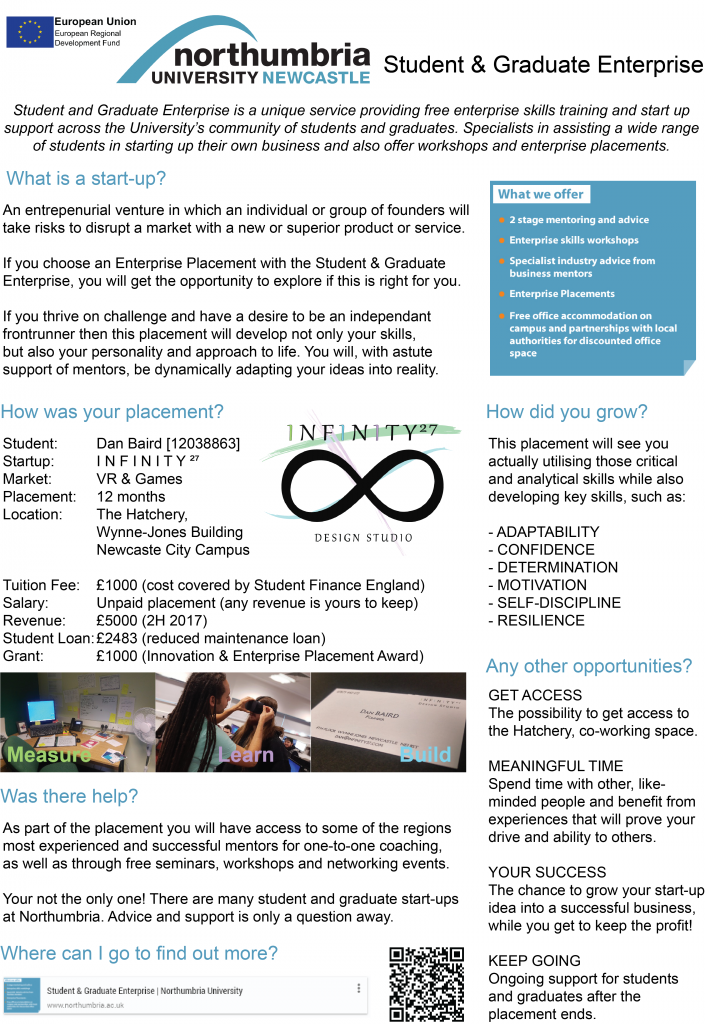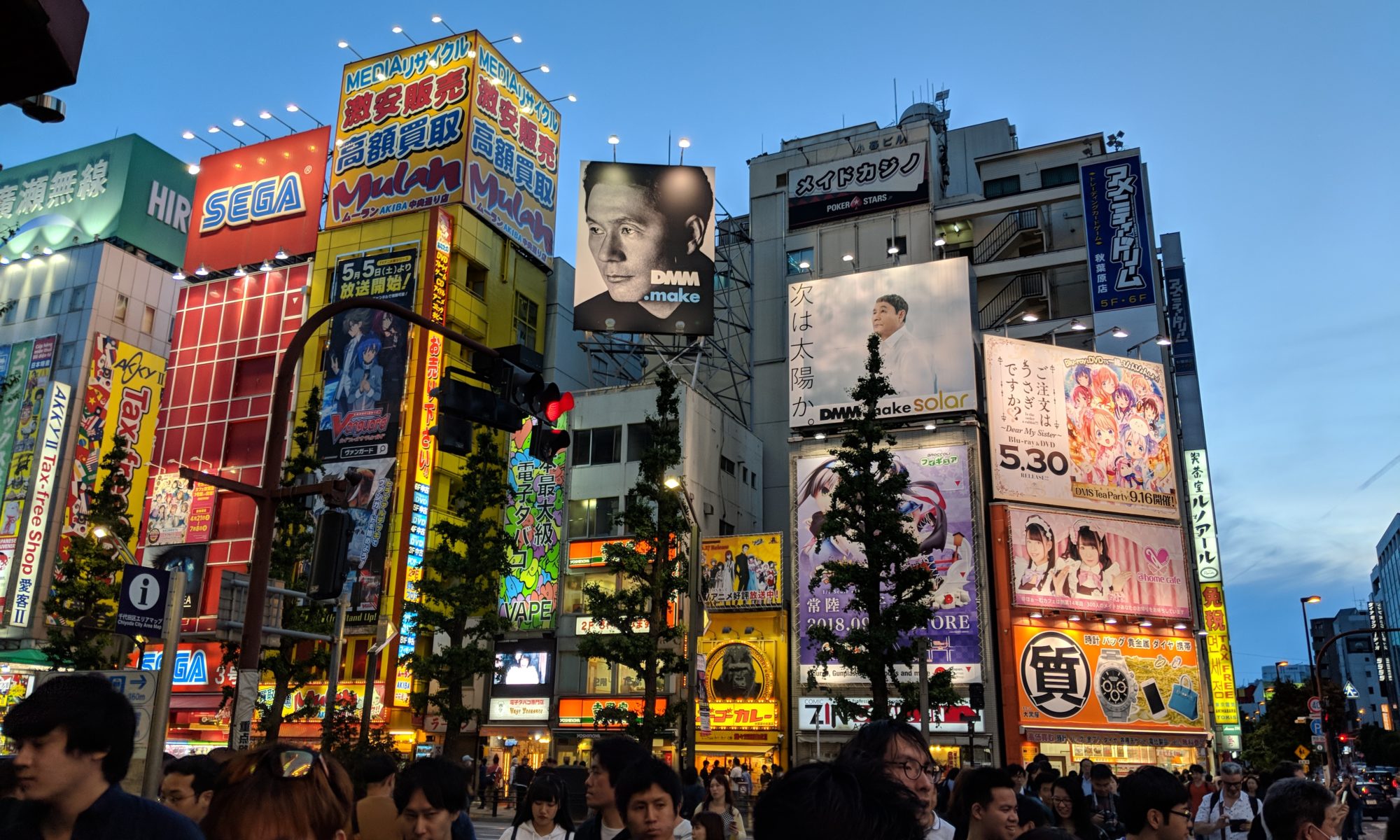Last month was the end of my placement at Northumbria University’s Business Start-Up Hatchery. To conclude my time there I was asked to complete a series of tasks, which included writing a reflective report as well as creating a poster to encourage other students to consider the option. What follows are the finished articles.

In reflection, my time on placement has made me encounter some significant achievements and difficulties. As a mature student of Computer Games Design & Production, I was interested in the possibility of exploiting the new wave of interest in virtual reality (VR) and how a start-up could fit into the industry landscape.
It all began with reading The MOM Test (Fitzpatrick, 2014); getting into customer conversations and applying what I’d learned about lean start-up. The approach given in the book helped me overcome my personal anxiety of seeking validation for my idea. I made sure to get perspectives from customers, but also from people working in the industry, to be able to compare as many perspectives as possible. Insights from these conversations gave me a few ideas I could consider and this first practice of asking customers questions without leading them has served me well throughout the placement.
I began systematically and proactively approaching businesses with my market researched proposals. Reached out to every business associated with the VR and games industries. This gave me my first interested parties, in the form of a games retailer and a computing college. Then I moved on to building experiments that would prove or disprove the routes to market I had hypothesized through the business model canvas exercise. Two of the significant failures were with the retail and education focused business models.
Despite being able to organize and run a successful promotional event, I was perhaps too quick to put this together, as it seemed retailers were not interested in paying for such a service – either outright or through commissions – which left me with experience under my belt but having wasted a week of time. I would recognize this while reflecting upon the venture in my personal blog. This was critical as it helped me plan to avoid this type of mistake in what would be an upcoming seminar and workshop work for a college.
This, while being a great experience, more planned, communicated and thought-out than my first attempt; would too be a failure masquerading as a success. After many months of rescheduling and reworking planned material for the three-day event, it was finally postponed until the following academic year by the client. This time it wasn’t that they hadn’t agreed ahead of time to pay for the service, no. They were very keen to, but uncertainty around their availability and access to equipment for the group sizes they wanted caused them to cancel at the last minute. What I did learn from this was not to invest so heavily in one project, as this left me without that expected source of revenue at a time when I would need it to invest back into expanding the business.
At that point, again, I had realized that I had not executed the true lean methodologies that I had been studying and instead had let a desperate confirmation bias guide my decision making. I needed to do deeper market research and revise the focus of my business model. I felt there was something there and that I had gotten close, but perhaps I was looking at the wrong customers.
While I needed to take time out to hone my idea I found some success with freelancing contracts from the university. After completing one pro bono I was soon after offered multiple paid assignments. This was a result of my initial networking and gave me the promise of a stable, reliable source of income while I worked my idea. However, further down the line I would find that my client had delayed paying my invoice and so I had to begin chasing the outstanding amount. This, along with a freelancer not doing work he was contracted to, has created a well of uncertainty which has affected my ability to grow the business and delayed my plans to begin testing my now refined business model canvas.
The model I have arrived at by this point is important, as it is an acceptance by me, because of the evidence and feedback I am getting, that the current state of the VR hardware available and its low market share means it would be too risky to develop applications and games only for that platform. For example, in my spare time, I continued to develop three prototypes and measured the barriers I would have to overcome in the design limitations of VR to create a groundbreaking prototype to break even – considering I could not afford additional resources or staff because of the pre-revenue state of the business. VR would become part of the business, not the central focus; that would become open source video games.
I gained more than that realization though. As I developed I found that I was furthering my skills in programming, a crucial component of work that is used in my course and invaluable in the industry I am in. I also got noticed, getting myself additional co-working space access at the VRTGO Labs, a regional center for emerging technology companies such as my own. Getting into VRTGO Labs and mingling with similar businesses has given me an advantageous position which should help me validate the new business model quickly, or at least give me opportunities to pitch myself as a proven developer and potential employee/intern.
Though I could have chosen to take a safer, work based placement with a game developer, I feel I have made the most of the placement year by taking this opportunity to test my ideas in relatively safe conditions. Having attended the placement seminar in the first week of my second year I knew that I was prepared to seek out further information and I knew who to contact for that. Along with strong messaging and easy to find placement website I had no worries that I could find a suitable for the year.
Despite being a student of a creative and technical course, with no background in business, I found that I could manage relatively easily with a few adjustments. The business aspect of a games company always seemed very different to the game design and production elements I was training for, but I managed to reconcile them as two sides of the same coin. With similar methodologies and tools, such as: lean and agile approaches being applied to iterate through ideas; project management and risk planning; and using customer feedback to create better products and services.
I am a mature student with a long work history. By having me look at the industry as a whole – discovering and analysing problems, then proposing solutions – I have a greater appreciation and understanding of how a game developer functions in both the creative and economic realms. Having had to summon, first-hand, the dedication, discipline and drive that is required to stay focused and motivated through the difficulties, I feel more adaptable, resilient and wise. This is crucial to my personal goal, which is to carry on developing the start-up I incorporated, so I can apply the knowledge I gained on my course, as well as that which I have gained through the learnings on this placement. Learning to communicate, network, problem solve and consider different approaches has not only helped me see the opportunities available in my chosen field, but also in the larger tech industry. I have a deeper understanding of how my chosen role interacts with the many, complex elements that make up a game development company. This knowledge strengthens the foundation of my previous years of study and gives me the in-depth, practical experience which I am confident has developed my professional skills beyond that of my peers.
What was not intuitive to me immediately was the guidance given on trying to provide services before creating a product. As I had the idea that I would be spending my year working away at producing a prototype which I could take to investors. This was not what I expected but I came to understand why this is done; as developing a product takes longer, whereas service-based businesses can be set up relatively quickly.
Other than this the placement did not fail to meet any of my expectations. In fact, the amount of support available through the mentors exceeded my expectations, as I did not envision so many links to successful and sage business advisors; especially not for free.
Weekly meetings with my supervisor, as well as completing the monthly and quarterly development logs, gave me a place to solidify my thoughts and really helped me maintain a velocity and direction that felt manageable. In contrast, the lack of co-ordination on the universities part regarding the assignment of my placement tutor, was frustrating. As I had to be assigned a different person after my original contact was unavailable for some reason. This was quickly resolved however and I was put in touch with an excellent visiting tutor who was, after the delay in the exchange, rather attentive and punctual.
I would like to see more resources being given to the Business & Enterprise Team by the university to support students who choose this option, and a greater promotion of this placement option to second year students who may have missed or forgotten the option for whatever reason. Since the placement is unpaid it wouldn’t hurt to perhaps raise some funding – or even, in some way, get the students to – so that students who encounter financial hardship can be supported. For me, I found that the risks and burden of running a business soon ate into my income and savings, especially when I was expecting a contract to pay at a certain time. Having to provide for my partner and baby boy exacerbated this, but I was left out in the cold when I asked the university if there were any support options.
This year has started me on the right path in regard to my career. The initial worries of setting up a business and failing have been addressed, as I have spent this time doing just that. While I have not been exclusively tackling video game related projects and tasks, I have been developing my personal abilities which if not directly related are in some ways valuable in their transferability.
Identifying the need to drop VR as the central idea through rigorous revision of the business model canvas and was the result of a year-long journey exploring how this nascent technology is being used by businesses to create value for its customers. Every step I have taken to get here has – including the set-backs and difficulties – in some way, exercised and expanded my skills, given me a taste of what running a business is like, made me more humble, honest and realistic in my approach to the final year of study.

